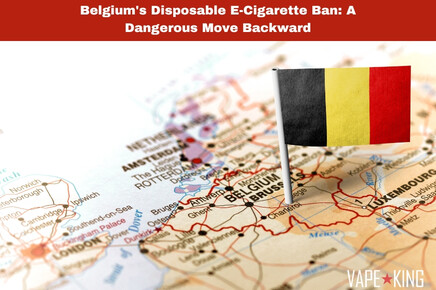Belgium's Disposable E-Cigarette Ban: A Step Back for Harm Reduction

On January 1, 2025, Belgium made history as the first European Union nation to implement a nationwide ban on disposable e-cigarettes. While this decision is being celebrated by some as a victory for public health and environmental protection, it has sparked concern and criticism from vaping advocates, harm reduction experts, and consumers alike.
A Blow to Harm Reduction
Belgium's ban, spearheaded by Health Minister Frank Vandenbroucke, is built on claims that disposable e-cigarettes are designed to hook teenagers on nicotine. While youth access is a legitimate concern, this sweeping ban ignores the critical role these devices play in helping adult smokers transition away from combustible cigarettes.
For many smokers, disposables offer an accessible, convenient, and effective alternative to smoking. By removing this option, Belgium risks pushing smokers back to cigarettes, undoing years of progress in harm reduction. Instead of addressing the root issues, such as enforcing stricter age restrictions and regulations, Belgium has opted for a blanket ban that punishes responsible adult users.
Environmental Concerns Overlook Better Solutions
Another key justification for the ban is the environmental impact of disposable vapes, which contribute to plastic waste and contain non-recyclable batteries. While these concerns are valid, banning disposables outright overlooks more sustainable solutions, such as recycling programs, incentivizing eco-friendly designs, or implementing manufacturer take-back schemes.
Steven Pomeranc, owner of the Vapotheque shop in Brussels, acknowledged the environmental impact but pointed out the potential for more responsible alternatives. “The battery is still working when the device is empty. That’s what’s terrible—you could recharge it, but there’s no way to do so,” he explained. Instead of outright prohibition, Belgium could have worked with manufacturers to address these flaws.
Ignoring the Bigger Picture
Belgium’s ban is part of a broader push to modernize EU tobacco laws, with Vandenbroucke urging other nations to follow suit. However, this heavy-handed approach risks setting a dangerous precedent. Prohibition rarely works as intended—it often drives products underground, creating unregulated black markets that pose even greater risks to consumers.
The vaping community and public health experts have long advocated for smarter regulation over outright bans. Clear labeling, age restrictions, and robust recycling initiatives could achieve the same goals without alienating adult consumers who rely on these products to quit smoking.
The Fallout of the Ban
As Belgium enters its second week under the new law, the impact is becoming clear. Consumers are frustrated by the sudden loss of their preferred products, and many shop owners are bracing for financial losses. Worse, without disposable e-cigarettes, there’s a genuine concern that some smokers may revert to combustible cigarettes—a far more harmful alternative.
This ban, while well-intentioned, may ultimately do more harm than good. Rather than supporting adult smokers in their journey to quit, Belgium has chosen to take a one-size-fits-all approach that punishes everyone.
Moving Forward
Belgium’s decision to ban disposable e-cigarettes is a reminder of the importance of balanced policymaking. While protecting youth and the environment are crucial goals, these must be weighed against the benefits these products provide to adult smokers. As the rest of the EU watches Belgium’s experiment unfold, it’s essential to learn from the unintended consequences and advocate for smarter, evidence-based solutions that truly prioritize public health.
No posts found
Write a review


